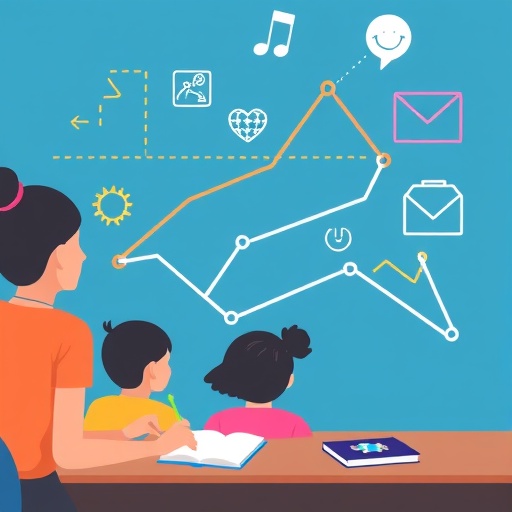In a groundbreaking large-scale meta-analysis published in the October 2025 issue of the Review of Educational Research, scholars have articulated compelling evidence that social and emotional learning (SEL) programs, when implemented universally in schools, significantly enhance not only students’ social and emotional development but also their academic achievements across multiple subjects and grade levels. This comprehensive study synthesizes data from 40 empirical investigations, encompassing over 33,700 students spanning grades one through twelve, and breaks new ground by quantifying the academic benefits of SEL programs with unprecedented rigor and scope.
The investigation was spearheaded by Cheyeon Ha, now an assistant research professor at the University of Southern California, in collaboration with Yale’s Education Collaboratory team, including Michael F. McCarthy, Michael J. Strambler, and Christina Cipriano. Their analytic framework meticulously disaggregates the multifaceted effects of SEL interventions, offering a nuanced understanding of how these programs foster academic performance alongside social-emotional competencies. The research consolidates findings drawn from a culturally and geographically diverse sample, with studies conducted in twelve countries between 2008 and 2020, thereby enhancing the external validity of the conclusions.
The heart of the study lies in its affirmation that universal SEL programs—those deployed schoolwide rather than targeting select groups—yield statistically significant improvements in academic metrics such as standardized test scores and classroom grades. Ha and colleagues underscore that such gains transcend mere social well-being, positioning SEL as an integral pedagogical tool that enhances cognitive domains including literacy and mathematics. This insight challenges the entrenched misconception that SEL is ancillary to academic instruction, instead firmly situating it within core educational imperatives.
Critically, the meta-analysis reveals that the impact of SEL on academic achievement is most pronounced at the elementary school level, where social and emotional skills are foundational to cognitive development and learning engagement. However, evidence at the middle and high school levels remains less definitive, due largely to a scarcity of rigorous research in these age groups. This evidentiary gap signals an urgent need for further longitudinal and experimental studies to elucidate the mechanisms by which SEL can sustain or amplify academic gains through adolescence.
Duration of program exposure emerges as another pivotal factor influencing efficacy. The authors rigorously quantify that SEL interventions extending beyond one academic semester—approximately four months—are consistently associated with measurable academic improvements. This finding suggests that sustained engagement with SEL curricula is necessary to nurture enduring cognitive and socio-emotional competencies, refuting any notion that brief or superficial implementation can produce meaningful educational outcomes.
Moreover, the integrative analysis highlights that the two academic domains most positively influenced by SEL participation are literacy and math, which are critical predictors of long-term educational and career success. This correlation supports theoretical models postulating that social-emotional skills such as self-regulation, empathy, and collaborative problem-solving contribute fundamentally to academic tasks, facilitating improved information processing, motivation, and classroom behavior.
Dr. Christina Cipriano, lead collaborator and associate professor at Yale School of Medicine, emphasizes that these findings carry profound implications for educational policy and practice. She advocates for embedding SEL not as an optional module but as a core component woven through all aspects of school curricula. By doing so, educational institutions can foster holistic student growth, maximizing academic potential while promoting emotional resilience and interpersonal skills.
These revelations are particularly salient for policymakers and educational leaders striving to close achievement gaps and promote equity. Since universal SEL programs are accessible to all students, they serve as a democratizing force within education systems, ensuring that socio-emotional skill development is not a privilege but a standard, inclusive practice. The study thereby frames SEL as a strategic equity lever and a cost-effective investment for enhancing student success at scale.
The robust methodological approach of the study, involving systematic review and meta-analytic techniques, lends considerable empirical weight to these conclusions. By aggregating and statistically analyzing findings across diverse contexts and populations, the research delineates a consistent pattern of positive academic impacts attributable to SEL, reinforcing the credibility of the evidence base guiding educational innovation.
In sum, this seminal research establishes social and emotional learning as a dual-purpose educational framework that concurrently advances students’ academic achievement and social-emotional well-being. It affirms that effective SEL programming is neither a peripheral nor supplemental educational endeavor; rather, it is essential for cultivating the integrative skills necessary for success in school and beyond.
As educators and policymakers digest these findings, there is a clarion call to reconceptualize curricula design and resource allocation to prioritize sustained, universal SEL. Doing so promises not only to optimize learning outcomes but also to nurture a generation of emotionally intelligent and academically prepared individuals, poised to meet the complex demands of a rapidly evolving global society.
This comprehensive study, titled “Disentangling the Effects of Social and Emotional Learning Programs on Student Academic Achievement Across Grades 1–12: A Systematic Review and Meta-analysis,” contributes a critical evidence base that can catalyze transformative reforms in educational systems worldwide. Curricular integration of SEL offers a scientifically validated pathway to improving educational equity and effectiveness at a pivotal moment in education policy discourse.
Subject of Research: Effects of Social and Emotional Learning (SEL) programs on students’ academic achievement across grades 1-12
Article Title: Disentangling the Effects of Social and Emotional Learning Programs on Student Academic Achievement Across Grades 1–12: A Systematic Review and Meta-analysis
News Publication Date: October 9, 2025
Web References:
Keywords: Social and Emotional Learning, Academic Achievement, Education Research, Meta-analysis, Educational Equity, Childhood Development, Literacy, Mathematics, Universal Programs, Program Duration, Educational Policy, Systematic Review




